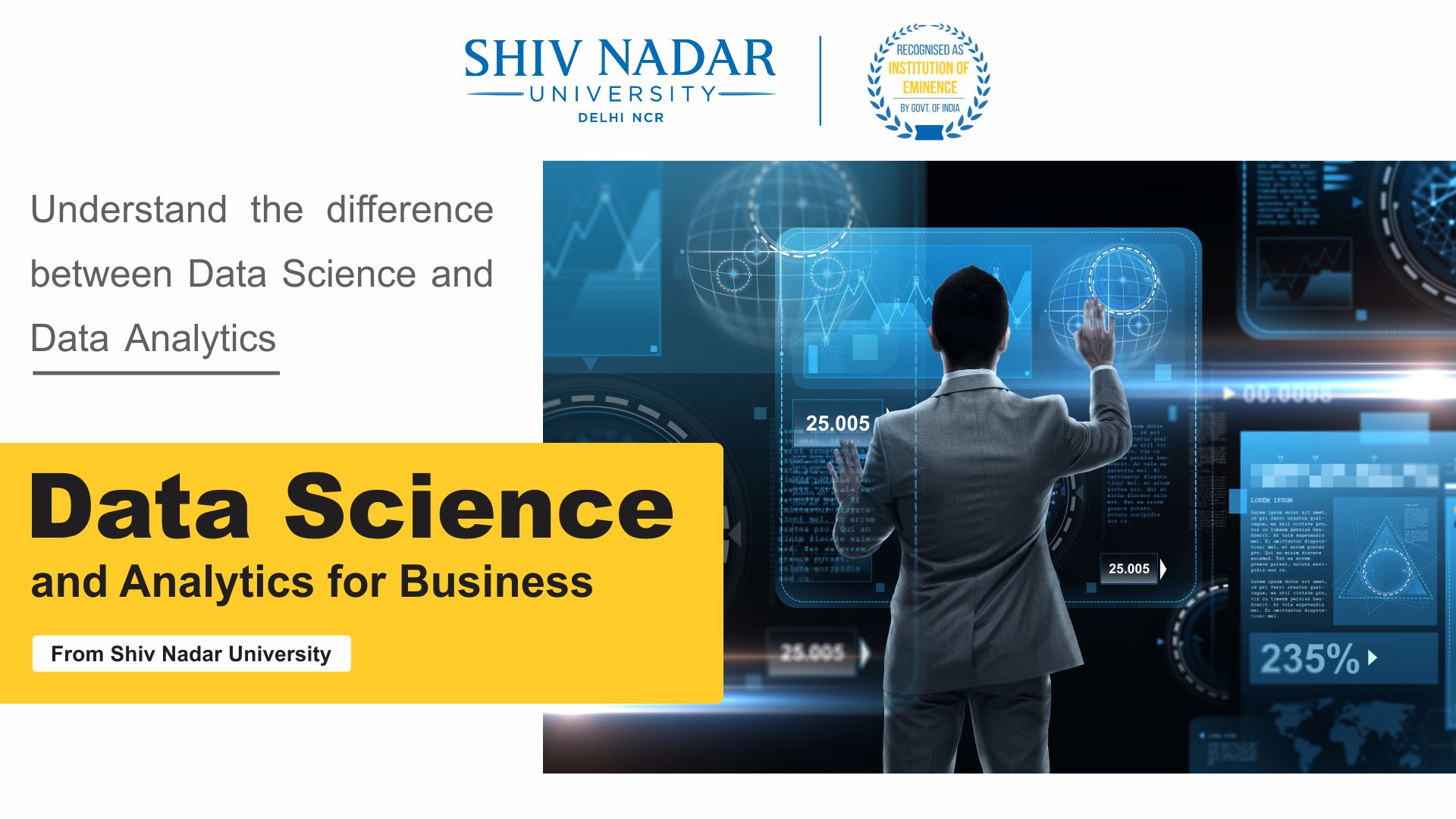In the business world, terms like “data analytics,” “data science,” “big data,” and even “data mining” are common variants. However, for the average person and even some specialists in this industry, some confusion still remains. Many have trouble properly defining data analytics and data science correctly, and wrongly assume they are the same.
If you are planning to start a career in this career field, you should know what to learn first. Read on to know more before deciding on the best courses for data analytics or data science you should apply for at Shiv Nadar University.
Key Points of Differences
Both data science and data analytics focus on monitoring and working with large volumes of data. However, the main part where these two differ is how the professionals handle the said data.
Take up training in data science or data analytics with our experts at Shiv Nadar University to improve your skills in either option soon!
Uses in Organizations
In the professional field, you have to utilize statistics, maths, and programming skills to get data-driven insights and plan strategies. This is common for data scientists; you would learn the technicalities when you learn data science – Shiv Nadar University.
Data Science
Data scientists in organizations work with data modelling, machine learning, and utilize algorithms for automating the system operations. Additionally, you need to have domain expertise and experience to handle meaningful data for field-specific tasks.
The areas of business operations to focus on as a data scientist include product development, marketing, sales, finance, and information technology (IT).
One example of data science usage in organizations is in the healthcare industry for diagnostic research and MRI/X-Ray reading via computers. Statistically, “Computer Systems Design + Related Services” employs the highest number of data science experts.
Data Analytics
With a data analytics certificate, you would learn to use programming, statistics, and technical skills for data insights. In organizations, this skill is necessary for quick and systematic data collection and maintenance. You would use your skills as a data analyst to identify trends and then prepare solutions concerning the current market conditions.
Some examples of the usage of data analytics in firms include store location spotting, recommendation features, and order tracking in retail/e-commerce/logistics industries. Reportedly, the employment rate of data analytics professionals, specifically operations research analysts, would increase by 26% within 2028.
Educational Qualification
Data Science:
You need to enhance your education in statistics and mathematics and also improve your hacking skills. Having a master’s degree in data science is valuable as well.
Data Analytics:
You should grow your knowledge in statistics and mathematics. Moreover, take a course like data science and analytics for business for an advanced degree in analytics. You should train with the tools for quantitative decision-making.
Join a Shiv Nadar University data science or data analytics course if you have these qualifications!
Skills
Data Science
The important technical skills include:
- Data modeling/visualization
- Programming languages
- Object-oriented programming
- Data warehouse/data mining
- Machine learning
- Computer science
- Statistics
Data Analytics
Here are the main technical skills you should improve upon:
- Data mining
- Data warehousing/analytics
- Data visualization tools
- Predictive modeling
- Database reporting and management
- SQL/SAS/R programming
Job Roles
Data Science
After training in a data science certification course, you would handle roles such as:
- EDA (Exploratory Data Analytics)
- Machine learning processing and operations
- Data trend analysis and predictions
- Processing, verifying, and cleaning data integrity
Data Analytics:
Some of the job roles data analysts are in charge of in businesses include:
- Clean data
- EDA
- Create visual dashboards
- Develop KPIs
Q&A
One of the key variations between both is how each professional type finds out its solutions.
Data Science
They study the data to spot necessary questions to solve. Then, they focus on finding the solution.
Data Analytics
These professionals get the questions directly and use their skills to prepare answers.
Salary
The average salaries also differ at varying rates across multiple industries and countries.
Data Science
Data scientists earn a median salary of $122,840 on average. The highest positions can earn over $189,780 approximately.
The average salary structure per year and experience in India differ as:
- Entry-level data scientists with 1 year or less experience earn Rs. 5,34,765.
- Early-level data scientists with 1–4 years of experience get Rs. 7,87,329.
- Mid-level data scientists that have 5–9 years of experience earn Rs. 13,85,816.
- Experienced data scientists with 10–19 years of experience gain Rs. 17,59,961.
- Expert-level data scientists with 20+ years of experience get Rs. 11,00,000.
Data Analytics
The medium salaries can range from $51,033 (insurance claims analyst) to $1,78,606 (chief data officer) as per a Payscale + Indeed.com comparative report.
The average salaries in India differ as:
- Entry-level data analysts with 1 year or less experience earn Rs. 3,42,291.
- Early-level data analysts with 1–4 years of experience get Rs. 4,26,402.
- Mid-level data analysts that have 5–9 years of experience earn Rs. 6,96,043.
- Experienced data analysts with 10–19 years of experience gain Rs. 9,34,951.
- Expert-level data analysts with 20+ years of experience get Rs. 17,50,000.
P.S. All are approximate figures.
Conclusion
Data analytics and data science have a lot of similarities on a broader scale. In terms of educational qualifications, skills, and roles, aspirants do not have to focus on two entirely different routes.
While this does make it hard to differentiate between the two on a superficial level, there are specific nuances to both individually. If you are planning on pursuing a course in data science or data analytics, learn these first.
Talk to us if you are still unsure about these options and apply for the program soon!






